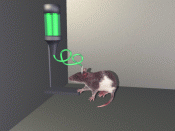2 |
Motivation and the Brain in Refraining from Using Drugs
Addiction according to Dictionary.com is, the state of being enslaved to a habit or practice or to something that is psychologically or physically habit-forming, as [drugs], to such an extent that its cessation causes severe trauma. For many years the relationship between one's brain and addiction has been studied by psychologist. As well as what causes one to become addicted to drugs and what motivates them to refrain from using drugs. When one becomes addicted to drugs refraining from using drugs or breaking that addiction can be difficult. There are many different things that can play a role in what causes one to become addicted to drugs rather it be from doing it to cope with hard times in life, to just partying with friends, either reason can lead to one becoming addicted.
Brain Structures and Functions
The brain is the most complex and important part of the human body; it controls your heart beat, tells you to breathe, controls your emotions, etc.
When one becomes addicted to drugs there are three areas of the brain that are affected; the brain stem, the limbic system, and the cerebral cortex. The brain stem is in control of one's breathing, sleeping, and heart rate; the limbic system is in control of one being able to experience pleasure, and the cerebral cortex is in control of one's senses (see, feel, hear, and taste), and one's ability to be able to think. Since some drugs (marijuana and heroin) contain chemicals that mimic the natural neurotransmitters, it confuses the brain and activates nerve cells. When it activates the nerve cells it does not do it the same way as the natural neurotransmitters. This will cause the brain to send abnormal messages throughout the network, (Volkow,


